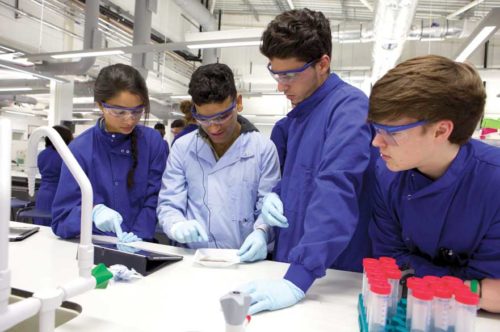COURSE OVERVIEW
This course gives you a wide understanding and knowledge of this exciting specialist field. You begin with a foundation in microbiology, cellular chemistry and anatomy before progressing to biochemistry and biotechnology; human health and environment; the application of biology in industry; and the impact of human population growth on our environment. In your final year, you develop your knowledge of the biochemical and biological mechanisms related to health and disease, exploring areas such as pathopharmacology, immunology, and cell and molecular biology.
The course also helps you evaluate and confidently discuss the ethical issues around biological developments like cloning and the Human Genome Project.
In your final year, you undertake your own research project, under the guidance of the Biological Science team, all of whom are actively involved in research themselves.
WHY CHOOSE THIS COURSE?
- It’s a leading-edge course, exploring the impact of the latest advances in areas such as biotechnology and medicine
- You are taught in our state-of-the-art laboratories, within the University’s new, centrally placed STEM building
- Our Biological Science team has over 30 years’ experience and are involved in a range of research projects from environmental science and cancer treatment to biophysical analysis of proteins and drug interactions
- The course offers a broad-based training so you’ll graduate with key transferable skills like critical thinking, review writing, data interpretation and communication
- It opens up a variety of possible career paths, not only in science-related industries but in education, scientific sales and marketing, and technical media
CAREER PROSPECTS
Key aspects of the course that emphasise employability include:
- Training in key laboratory techniques relevant to employment within the Biological Sciences, including awareness of relevant health and safety, legal and ethical considerations.
- Training and practice in the scientific method that underpins all scientific research (developing novel hypotheses, testing these by experiment, accurately interpreting data and understanding error, and drawing valid conclusions).
- Practice in professional standards of reporting including laboratory reports using the standards of professional research publications, preparation of scientific conference posters, and written and oral presentations.
- Guest lectures from employers and from the University’s careers service.
- Graduates from our BSc (Hons) Biological Science course may seek employment within academic or government research laboratories, or within the pharmaceutical or biotechnology industries. Relevant science jobs outside of laboratory work include teaching, scientific equipment sales reps, scientific journalism or media, and public awareness of science. Furthermore, the training our students receive in information sourcing, data analysis, and presentation skills are relevant and important to a broad range of non-science careers from managerial posts to politics.
Graduates from our BSc (Hons) Biological Science course may also pursue further scientific training through a variety of Masters programmes or PhDs related to biosciences, or through graduate entry medicine or dentistry programmes.
Zobacz więcej na stronie uniwersytetu >>
Wiza studencka do Wielkiej Brytanii
Aby studiować w Wielkiej Brytanii potrzebujesz wizy studenckiej. Aby złożyć wniosek o taką wizę studencką musisz zdjać certyfikat językowy na poziomie B2.
Uważaj! Do celów wizowych musisz wybrać wyłącznie egzamin w wesji Secure English Language Test (SELT) UKVI .
Co to jest test SELT UK VI registration? Przeczytaj więcej o testach SELT UKVI >>




















